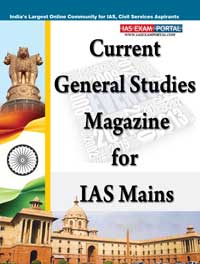(HOT) UPSC Current Affairs 2025 PDF
NEW! The Gist (JAN-2026) | E-BOOKS
Current General Studies Magazine: "Review Triple Talaq" August 2016

Current General Studies Magazine (August 2016)
General Studies - II "Debate Based Article" (Review triple talaq)
The issue of triple talaq in one sitting has once again become a subject of heated discussion. Many Muslims continue to oppose the argument that uttering the word talaq in one sitting cannot dissolve a Muslim marriage. This is because triple talaq in one sitting as constituting an irrevocable divorce has been the position of many (though not all) of the scholars affiliated with the four major schools of Sunni jurisprudence for centuries. Some Muslims incorrectly believe that any rule whose origin is from outside the four schools of Sunni jurisprudence is prohibited, and that is why they oppose the argument for making three talaqs in one sitting to be counted as just one. However, this concept has no authentic foundation in Islamic jurisprudence. In Sunni jurisprudential history, there are many instances of practices which were followed earlier by others and were lateradopted by the Sunni ulema or scholars of Islamic jurisprudence due to changes in socio-historical circumstances.
Since the period of the companions of Prophet Muhammad, a considerable number of Muslim scholars and jurists have insisted that if a Muslim husband utters the word talaq three times in one sitting, it constitutes one talaq. According to Ibn ul-Qayyim (d.1350), the Islamic jurist and theologian, some noted companions of the Prophet such as Ali (the fourth Caliph of the Sunni Muslims), Abdullah bin Masood, Abdullah bin Abbas, Zubair bin Awwam and Abdur Rahman bin Awf, viewed the utterance of the word talaq in one sitting as one, not three, and, thus, as not resulting in an irrevocable divorce (al-talaq ul-mughallaza).
When formulating the law about divorce, it appears that the Quran tends to restrain quick divorce since it clearly suggests that “a divorce is only permissible twice: after that, the parties should either hold together on equitable terms or separate with kindness.” (2:229)
According to this verse, there must be room for retaining the wife after uttering the word talaq. This would not be possible if triple talaq in one sitting were considered irrevocable. It seems illogical and unnatural that a marital relationship of, say, 30 years breaks off within 30 seconds, without leaving a chance for reconciliation. The Quran (4:22) refers to the agreement which a husband and a wife pledge together as a ‘strong covenant’, and obviously, that cannot be so vulnerable and easily broken by a one-sided decision taken in a state of anger or depression.
Those who claim that three talaqs in one sitting count only as one, and not three — and so does not result in the end of a Muslim marriage — infer their opinion from a hadith recorded in the Sahih Muslim, a collection of hadith reports widely respected among Sunni Muslims. According to this report, Abdullah bin Abbas, a companion of the Prophet, said that triple talaq in one sitting was considered as one in the period of the Prophet, the period of the first caliph Abu Bakr, and during the early years of the second caliph Umar (Sahih Muslim, 1482).
Another tradition relates that a companion of the Prophet, Rukanah bin Yazid, divorced his wife thrice in one sitting. He then regretted what he had done and approached the Prophet. The Prophet asked him how he had divorce his wife. Rukanah answered that he had done so by pronouncing the word talaq thrice. The Prophet asked him if he had pronounced it in a single sitting, to which he replied in the affirmative. The Prophet then said that it had the effect of one divorce and that if he wanted to take his wife back he could.
Defenders of triple talaq in one sitting often cite the enforcement of this practice by Umar, the second Caliph. In response, it can be said that this was intended for the welfare of society in that particular socio-historical context. Umar thought it an appropriate ruling as men had made talaq a joke by taking back their wives even after uttering the word talaq several times, because of which their wives had to suffer, being stuck in a vicious circle and not being able to gain their freedom.
The issue of triple talaq is a sensitive one. Traditionalist Muslim scholars wrongly regard even the slightest deviation from the opinion of their school as unlawful. On the other hand, are the thousands upon thousands of Muslim women whose lives are being destroyed by the effects of this method of divorce.
It is incumbent upon Muslims to find a balanced solution to this in accordance with the teachings and spirit of Islam. Muslims must take initiatives for the reform of the practice of talaq. This reform needs to happen at the level of laws.
Many Muslim-majority countries have reformed their laws and consider three talaqs in one sitting to be just one. Indian Muslims must come forth to support this sort of reform, realising that it is essential for their own welfare.
(Source : Indian Express)

